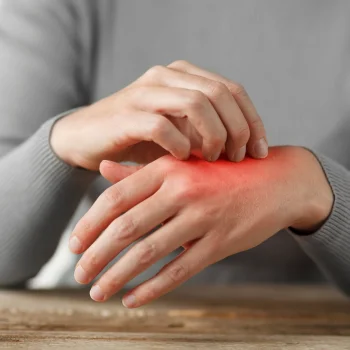Eczema Symptoms and Treatment Methods
What is Eczema?
Eczema (dermatitis) is a common skin disease that manifests itself with dryness, itching, redness and inflammation of the skin. This condition, which can be chronic, can be aggravated by periodic flare-ups and can be seen in all age groups.
Eczema Symptoms
- Itching: This is the most common symptom of eczema and increases especially at night.
- Redness and Irritation: Redness and sensitivity occur on the skin surface.
- Dryness and Flaking: The skin becomes extremely dry and may flake.
- Blisters and Inflammation: In advanced cases, small blisters and water-filled lesions may be seen.
- Skin Thickening: Constant scratching, can cause the skin surface to harden and thicken.
Types of Eczema
- Atopic Dermatitis: It is the most common type of eczema and is usually seen in allergic individuals.
- Contact Dermatitis: It occurs as a result of contact with allergens or irritating substances.
- Seborrheic Dermatitis: It manifests itself with oily flaking on the scalp, face and ears.
- Numular (Discoid) Eczema: It is characterized by round and flaky spots.
Eczema Treatment Methods
1. Moisturizer Usage
The basis of eczema treatment is to keep the skin constantly moist. Fragrance-free and intensive moisturizing creams are recommended.
2. Cortisone Creams
Creams containing cortisone are prescribed by doctors to reduce itching and redness. However, long-term use should be avoided.
3. Antihistamines
Antihistamines may be recommended to control itching.
4. Avoiding Allergens
Staying away from triggers such as dust, chemical products and perfumes can relieve eczema symptoms.
5. Phototherapy (Light Therapy)
In resistant eczema cases, phototherapy with UV light can yield successful results.
Tips to Prevent Eczema
- Limit soap and detergent use, prefer mild cleansers.
- Avoid direct exposure to sunlight and extreme heat.
- Stay away from stress, as stress can increase eczema flare-ups.
Conclusion
Eczema is a skin problem that can affect quality of life, but can be controlled with the right treatment and care. Early diagnosis and regular dermatologist check-ups reduce symptoms and keep the skin healthy.




